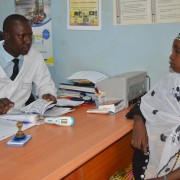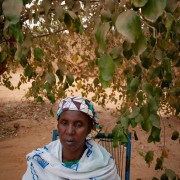Speeches Shim

It is late March and USAID’s Food and Reconciliation in Mali field staff are at Djenné’s main market. The project team has assembled not far from the Great Mosque — a UNESCO World Heritage Site — to set up at a large open-air gathering point where they welcome beneficiaries in groups of 30 in compliance with COVID-19 distribution guidance.

COVID-19 didn’t stop the annual health commodity quantification workshop in Mali. A smaller, but representative, group maintained social distance and wore masks to plan a reliable supply of PEPFAR, PMI and other USAID-supported health commodities for the coming year. During the annual quantification workshop, Mali’s National Quantification Committee estimates the quantity of life saving medicines and other health products needed to meet the country’s yearly needs. Quantification is a critical tool for guaranteeing access to essential supplies in the health sector and achieving global health goals.
Today, we celebrate the fifteenth anniversary of the United States President’s Malaria Initiative (PMI) and Mali's unprecedented success in malaria reduction. Malaria is one of the world’s deadliest diseases. According to the most recent World Malaria Report, there were an estimated 228 million cases of malaria worldwide and 405,000 malaria-related deaths in 2018. The United States, in partnership with the Government of Mali and other donors, contributed to a 60% drop in the prevalence of Malaria between 2015 and 2018 making Mali one of the world’s great success stories in the fight against Malaria.

In 2017, Dr. Namory Camara’s career took a new trajectory when, after seven years of working in private health clinics, he joined Mali’s civil service and was assigned to the Kadiolo Referral Health Center in the Sikasso region. At 37, he was appointed the reproductive health officer in this public facility, responsible for maternity services and working with midwives who had substantially more experience than he did.

Fatoumata Minta and her two children fled from their home after armed men attacked their village and burned it to the ground. They have been living at a camp for displaced people in Mopti, Mali, ever since. CRS, in partnership with the United States Agency for International Development, provided them with cooking supplies and cash, which Fatoumata used to purchase food, buckets and soap.

Comment
Make a general inquiry or suggest an improvement.